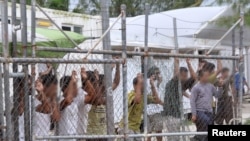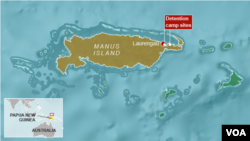Australian officials are trying to decide what to do with hundreds of asylum-seekers at a controversial detention center it has agreed to close in Papua New Guinea. Papua New Guinea’s Supreme Court ruled in April that the camp on Manus Island, one of two Australian-run immigration facilities in the South Pacific, was unconstitutional.
The closure of the Manus Island facility was announced Wednesday in a statement by PNG Prime Minister Peter O'Neill, who said an agreement had been reached after meeting with Australian Immigration Minister Peter Dutton in Port Moresby.
The question now is what happens to the 850 men housed at the facility? Senior officials in Canberra say the detention center will not close immediately. And they say the migrants will not be resettled in Australia. Most are from Afghanistan, Iran, Iraq and Syria, so voluntary repatriation is considered by rights groups to be unlikely.
They could be transferred to a second offshore processing camp sponsored by Australia on Nauru, a tiny island, where there have been recent allegations of widespread abuse of inmates, including children. In the past, Canberra has asked Cambodia and Malaysia to take in asylum seekers. New Zealand has also offered to resettle detainees held in Australia’s offshore camps.
Australian Immigration Minister Peter Dutton hopes that many of those housed on Manus Island will decide to go home voluntarily, as has been the case in the past.
“We provide thousands of dollars of taxpayer's assistance to provide packages of support to help those people return back to their country of origin and many hundreds have done that. Now, in cases like Sri Lanka, Vietnam, other countries like India, we have arrangements where if people refuse to go home, if they have been found not to be refugees that they can be forcibly returned. With Iran, for example, that's not the case. They will take voluntary but not involuntary returns and many hundreds have returned voluntarily to Iran. But people are making a decision in Manus, on Nauru at the moment, to say that they don't want to return even if they have been found not to be a refugee, and we cannot accept that situation,” said Dutton.
In April, judges in Papua New Guinea said holding detainees on Manus Island was illegal. At a senior ministers meeting Wednesday in the capital, Port Moresby, there was an acknowledgement by both Australia and Papua New Guinea that the court’s decision was final and the camp would close, although no date has been set.
Asylum seekers who arrive in Australian waters by boat are sent to immigration facilities in the South Pacific where their refugee claims are assessed.
Canberra insists its policy of sending asylum seekers offshore is saving lives at sea by deterring other migrants. Refugee campaigners, though, say conditions in the centers are inhumane and that Australia is turning its back on the desperate and vulnerable.








